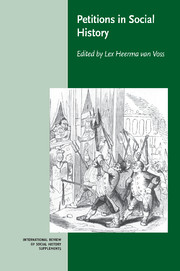Book contents
- Frontmatter
- Contents
- NOTES ON CONTRIBUTORS
- Introduction
- Voices from Among the “Silent Masses”: Humble Petitions and Social Conflicts in Early Modern Central Europe
- Supplications between Politics and Justice: The Northern and Central Italian States in the Early Modern Age
- The Power of Petitions: Women and the New Hampshire Provincial Government, 1695–1700
- Officially Solicited Petitions: The Cahiers de Doléances as a Historical Source
- Revolt, Testimony, Petition: Artisanal Protests in Colonial Andhra
- Deference and Defiance: The Changing Nature of Petitioning in British Naval Dockyards
- Petitions and the Social Context of Political Mobilization in the Revolution of 1848/49: A Microhistorical Actor-Centered Network Analysis
- The Image of Jews in Byelorussia: Petitions as a Source for Popular Consciousness in the Early Twentieth Century
- “Begging the Sages of the Party-State”: Citizenship and Government in Transition in Nationalist China, 1927–1937
- Private Matters: Family and Race and the Post-World-War-II Translation of “American”
“Begging the Sages of the Party-State”: Citizenship and Government in Transition in Nationalist China, 1927–1937
Published online by Cambridge University Press: 04 August 2010
- Frontmatter
- Contents
- NOTES ON CONTRIBUTORS
- Introduction
- Voices from Among the “Silent Masses”: Humble Petitions and Social Conflicts in Early Modern Central Europe
- Supplications between Politics and Justice: The Northern and Central Italian States in the Early Modern Age
- The Power of Petitions: Women and the New Hampshire Provincial Government, 1695–1700
- Officially Solicited Petitions: The Cahiers de Doléances as a Historical Source
- Revolt, Testimony, Petition: Artisanal Protests in Colonial Andhra
- Deference and Defiance: The Changing Nature of Petitioning in British Naval Dockyards
- Petitions and the Social Context of Political Mobilization in the Revolution of 1848/49: A Microhistorical Actor-Centered Network Analysis
- The Image of Jews in Byelorussia: Petitions as a Source for Popular Consciousness in the Early Twentieth Century
- “Begging the Sages of the Party-State”: Citizenship and Government in Transition in Nationalist China, 1927–1937
- Private Matters: Family and Race and the Post-World-War-II Translation of “American”
Summary
The premise of the Nationalist government at Nanjing (1927–1937) rested on a precarious balance of democracy and paternalism. The Nationalists drew their power from China's citizens, but they also subjected them to a regimen of training and control. Petitions from the “Nanjing decade” highlight the resulting tensions between government and the governed. Citizens from all walks of life accepted the ruling party's invitation to participate in the construction of the republic. Yet they also used petitions to seek redress when they believed the Nationalists had fallen short of their obligations. These documents mark a turbulent period of transition from imperial rule to representative democracy. They also characterize an era when new political ideas, new media, and new social organizations helped people take an old device and transform it into a useful weapon for asserting their rights as modern citizens.
TUTELARY GOVERNMENT AND THE EVOLUTION OF THE MODERN PETITION
The final Chinese dynasty had been overthrown in 1911 because it was unresponsive to the changing opinions of its subjects. The imperial government had maintained a tradition of court memorials circulated between local and higher officials, all the way up to the Emperor. But this system was increasingly taxed as the Qing government faced complex foreign and domestic crises, and in its final years the Qing dealt poorly with such challenges. The Chinese republic was founded on the idea that, by contrast, the new form of government would represent and be responsive to the will of the people.
- Type
- Chapter
- Information
- Petitions in Social History , pp. 185 - 208Publisher: Cambridge University PressPrint publication year: 2002
- 13
- Cited by

